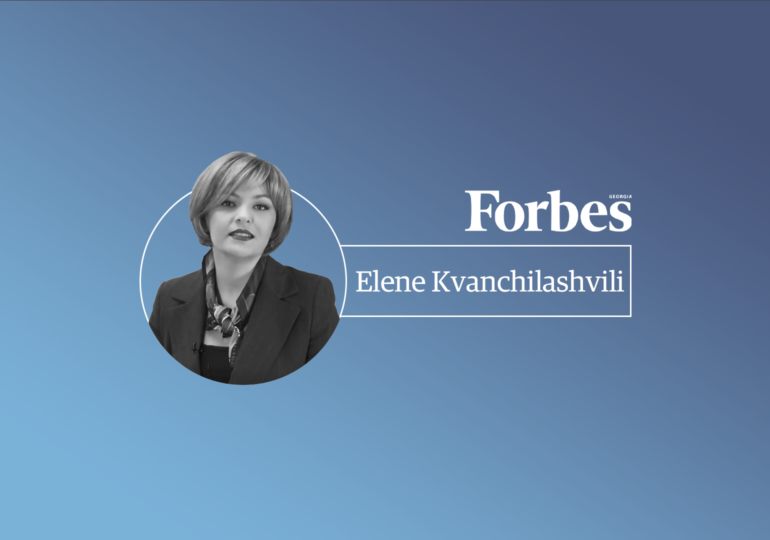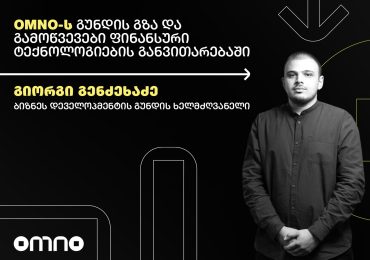Georgia’s PM has a special advisor on attracting FDI. Vazil Hudak now has a direct link to Georgia, as the former EIB Vice-President was presented to wider society in a special briefing on May 7th, 2021.
The decision came as a surprise since no one from the Georgian government had even hinted before that appointing a foreign advisor on bringing in foreign investment was being discussed.
Since the Prime Minister Irakli Gharibashvili sticks to a policy of minimal communication with the media and does so only through briefings without the possibility of asking questions, we still do not know whether there were some other candidates discussed or Mr. Hudak was the only choice of the Prime Minister.
Also, it is still hard to judge what is the exact job description that comes with the new appointment – the only practical goal that has been identified at the first briefing is for Georgia to become part of the 50-billion-euro initiative of Europe to support the SME sector globally.
“It is aimed as an endeavor for greater resilience,” Vazil Hudak, an EU envoy for SMEs explained at a briefing.“We have to operate together during a difficult period. It is true both for Europe and globally. It is of course due to COVID-19. However, I believe that difficult times are opportunities as well. We have an opportunity now to grow and develop in many different directions, create better quality in various areas, and attract support from the USA, EU and other countries. We know how to recover the economy through investment, more economic development and advancement. I believe that this is the future of Georgia as well as the EU.”
As Vazil Hudak briefly explained, this program has two main aspects: digitalization and green or environmental initiatives to address climate change. “These are the future directions of Georgia as well – to become more digital, more modern and greener. I believe that Georgia will thus come closer to Europe and this is the major aspiration of the Georgian government too,” Vazil Hudak noted.
Actually this is not the first time that our readers heard about Europe’s initiative to support a green economy and SMEs. As just one example to focus on, which was a very pointed suggestion from the IMF in an interview with Jihad Azour, the Director of the Middle East &Central Asia Department at the International Monetary Fund in early April 2021. “We see potential for new partnerships.” Mr. Azour said, “Europe is investing in a strong recovery. That’s expected to be a green recovery. This offers neighboring countries, like Georgia ,benefits.”
ADB told me earlier last month that it had been working hard with commercial banks to ensure long-term cheaper loans for SMEs to give them a chance of longer-term investment and growth. “Going forward we are also interested in developing opportunities for longer-term financing. Right now, it is hard to get financing for any length of time, and that makes it difficult to make longer term investments – the types of investments that businesses need to grow, and to employ more and more people. Loans are extremely hard to get, and we think that it should be a priority of the financial sector more broadly to help not only SMEs but also many other businesses as well,” the ADB resident representative to Georgia Shane Rosenthal said.
Earlier this year, in March, Mercedes Vera-Martin(former IMF Mission Head to Georgia)focused on SME importance but in a totally different light, linking it directly to the need for FDI as Georgia’s economy started to gradually recover. In my interview with the former IMF Mission Head, Mercedes Vera-Martin stressed that “special efforts” needed to be put in place to attract FDI to the country.
Well, hiring a special advisor on attracting FDI seems to be just that.
“You are in a location that can be very attractive, between East and West – Georgia being at the crossroads,” Mercedes Vera-Martin explained in an exclusive interview.“ The fact that you have an FTA (Foreign Trade Agreement) with China and with the EU can help some companies find geographic advantages by being located in Georgia. And for a country like Georgia, you don’t need to bring in very large companies – I mean, those are welcome, and they bring a lot of know-how – but you can also bring in medium-sized enterprises.”
Our loyal readers might also remember our big exclusive with Odile Renaud-Basso, EBRD’s President where she stressed that EBRD would stand with Georgia in its goals to focus on switching to a green economy and coming closer to implement the Association Agreement. “This will be very important,” Odile Renaud-Basso told me in February.
These examples make it clear that there seems to be a consensus among the international community that Georgia needs resources to support and develop the SME sector and green economy initiatives, and if the political situation in Georgia meets the required standards, then the country should not have problems benefitting once again from international programs.
So what did Vazil Hudak underline as his role during the briefing? “To help the government of Georgia to find ways to mobilize other resources. International support will bring benefits to the government of Georgia.” This might not seem like a tough goal to achieve, as the Prime Minister Irakli Gharibashvili also noted in his address, counting on Mr. Hudak’s advice to pull together PPP (Public-Private Partnership) projects and investment in strategic sectors. With all major or minor HPPs (High Priority Projects) on hold, and with Anaklia’s case still in international arbitration, a fresh look at the country’s challenges might serve Georgia well.
The Prime Minister’s open call that Georgia needs investment is a focus on FDI that many of us – in business or in business media – have long been waiting for. Coronavirus has served as a good catalyst to expose problems that have been piling up for more than a couple of years now.
According to preliminary data, the volume of FDI in Georgia amounted to $616.9 million in 2020, which is down by 52.9% compared to 2019. Current FDI inflow is the lowest since 2008/2009, which was the post-war period in the country. Official data shows that FDI hit a 15-year low in 2020. According to Geostat, the main reason for the decline in FDI was the transfer of several enterprises under the ownership of Georgian residents, it resulted in FDI reduction by $340.5 million.
Both business associations and major private sector players support the Prime Minister’s decision to bring an experienced voice to the international negotiations table. But strongly maintain one emphasis – the Georgian government should listen to its advisor.
Meanwhile, half a year should be enough to notice any results of Vazil Hudak’s advice to the Prime Minister. As one prominent Georgian businessman – Temur Chkonia – told me in a live TV-interview in ‘Analytics with Elene Kvanchilashvili’ ,we will observe any changes easily. “We have zero FDI today; when we have more, this means we can measure Hudak’s advice”.
ALL THE BEST, MR. HUDAK!
















